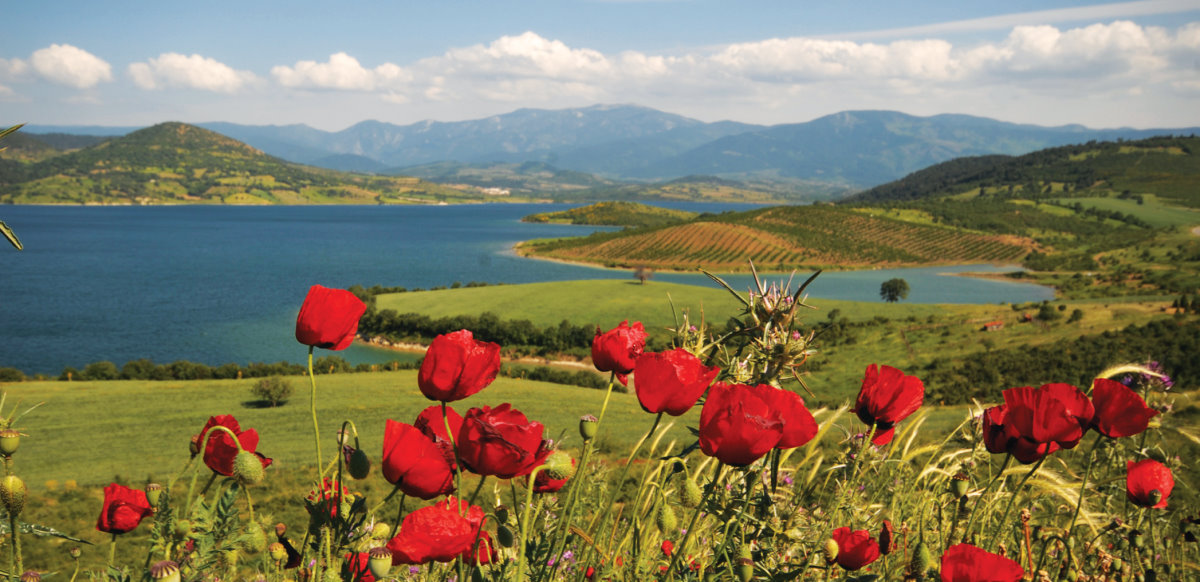Helen is the most beautiful woman in the world. Because of her beauty, all princes of Greece want to marry her. Seeing this, Helen's father makes all the candidates promise the following: Helen will marry one of them, but all of the others will support the husband as long as they live. After this promise is made, Helen marries Agamemnon's brother, Menelaos. While the Trojan prince Paris is trying to decide between the beauties of the three goddesses at Mt. Ida, Helen becomes the wife of Menelaos. Eventually Paris kidnaps Helen to Troy with the help of goddess Aphrodite. In response to this, as promised, all princes of Greece unite and start an expedition with a thousand ships to Troy, to bring Helen back. The war lasts longer than the Akhas thought. Hector is the general of the Trojan army. The strongest warrior of the Akhas is Achilleus. The war continues for ten years. In the end, Hector dies as well as Achilleus. The war ends with the Wooden Horse trick of Odysseus. At the gate of the city, Akhas leave a Wooden Horse filled with their best soldiers as if it is a present from the gods. Trojans consider whether to take this Wooden Horse into the city for quite some time and finally they take it in. Akhan soldiers that come out of the belly of the horse at night signal the ships that are waiting behind Tenedos by lighting a fire, and open the gates of Troy; in this way Troy is burned and destroyed. After the destruction of the city, Helen returns to her husband, Trojan King Priam and others are killed, and women are taken as slaves.

These are the events that have been told in the Iliad and Odyssey epics written by Homer 2700 years ago. However, we are not sure if any of these events are real or are they all work of the poet's imagination? How much of it is history and how much of it is tale? Answering this question is not that easy. When we ask what "history" is, the classical answer is this: it is a science that investigates the events and actions (wars, culture and civilizations, etc.) that took place in the past by means of resorting to documents and indicating place and time. The word history means chronologically noting down the events that is, chronicling; however, in daily language, there are phrases that mean different things, such as "to rewrite history", "to become history", "to be history" In other words, it is not always certain whether what history tells us are stories, tales or real. There is a saying in daily language that is "Don't tell me stories." Meaning that stories or tales are perceived as the opposite of reality, which is the source of history. Nevertheless, everybody knows that in every legend, there is a piece of truth.
It is traditional to start the history of the Greek states in Antiquity in 776 B. C. E. Because this is the date when the first Olympic Games took place and this has been accepted as the earliest chronological evidence. History-writing requires a dependable chronological structure, because mere information about the events that took place is not very useful for history-writing. What is important is when, in what order, by whom, and where these events took place. In other words, what are expected of history are not only probabilities but realities. However, such a definitive history-writing is very difficult for the periods in which there are no written sources. What should we do then? It is certain that there can be no actual history-writing that depends on oral traditions and memoirs. This is because written sources can be to a certain extent accepted as true resources and sometimes can be crossreferenced by other documents, which cannot be the case for oral resources. One can crossreference by whom, when, with what kind of information and for what purpose a written source was produced, and one can derive consequences from these. On the other hand, oral tradition is fluid and changes constantly, because the points that the narrator finds important are emphasized or taken out, or some secondary elements are forgotten, some foreign elements are added to the previous tradition, and in this way this process goes on further. In fact, the history of the Greek states and the Aegean region goes much further back than 776 B. C. E. Undoubtedly one can write a separate piece on the cultures of the Neolithic Period in the 6000 B. C. E. or those of the First Bronze Age in the 3000's; however, not all that is written about these is history but prehistory. One can present an outline of the Myceneaen culture in the last Bronze Age in the Aegean, or the cultures of the Bronze Age in west Anatolia. A brief sketch about a warrior society with leaders can be given; trade routes and relationships with the far-states can be mentioned and names of some kings that are at the center of power can be given. In this way, one can figure out what kind of a function the big palaces used to have before they were all destroyed by a sudden disaster in the 1200s B. C. E. Despite all this, these are far from being history.
Because, there are no written historical documents that mention these events that happened during those periods. We are not in a position to name a single emperor of the power centers of Myceneaen, Pylos or Theben. We know nothing of why or by whom the palaces were destroyed. Then, all we can do is to believe in the legends and stories told by the bards centuries later, and accept these as a piece of history. Undoubtedly, these legends, fables and stories told by the bards might have at least a piece of history in them. Nevertheless, specialists never accept the epic tradition as a source of history. This oral legacy is called legend, epic, or fables, not history.
